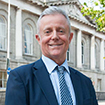Global Surgery Day, like Africa Day, is celebrated on 25 May. Here, Professor Ruairi Brugha, Interim Chair of Global Surgery at RCSI University of Medicine and Health Sciences, outlines RCSI’s long-standing commitment to addressing the global surgery need in Africa and asserts that addressing essential global needs should not be a zero-sum game.
On Global Surgery Day we should remember that conditions amenable to surgery are among the biggest causes of ill health and death in low- and middle-income countries, especially in sub-Saharan Africa where 95% of people have no access to surgical services. Access is poorest in rural areas.
The critical role of surgery at the district hospital in Africa was recognised by Maurice King 56 years ago in his seminal Medical Care in Developing Countries. King stated that, for rural communities in Africa, the defining characteristic of a hospital was its ability to provide emergency surgery, notably a caesarean section and a laparotomy for an acute abdominal surgical emergency.
Today, the provision of accessible safe surgery to those in need continues to be the hallmark of the district hospital in Africa, and provides the opportunity to promote and provide a range of other essential preventive and therapeutic services.
External factors
COVID-19, during its height, caused the cancellation of an estimated one third of surgeries worldwide. In Africa, where the population control measures in 2020 often had a greater negative impact than had the direct effects of the virus, COVID-19 particularly disrupted country efforts to provide essential healthcare services to neglected rural populations.
This has been made worse in 2022 by the understandable attention, but also the diversion of global development resources, to Ukraine, and aggravated by reduced availability of food in some of the poorest countries worldwide. Addressing essential needs, however, is not and should not be seen as a zero-sum game.
Post-COVID recovery is an opportunity to use surgery – a complex service that Institute of Global Surgery research has shown can be feasibly, effectively and safely delivered at district hospitals – to lead successful efforts to achieve the United Nations Sustainable Development Goal (SDG) 3: Good Health and Wellbeing. In particular, surgical services are essential to achieving the SDG targets of reducing mortality from non-communicable diseases and road injuries, achieving universal health coverage and supporting the health workforce in developing countries.
Strengthening health systems
The Institute of Global Surgery is building on RCSI’s ground-breaking approach to training surgical specialists in Africa, working with the College of Surgeons of East Central and Southern Africa (COSECSA); and now with other specialty colleges in Ireland and Africa to build capacity in surgery, anaesthesiology, nursing, and obstetrics and gynaecology. Secondly, we are generating new evidence on how to meet the surgical needs of neglected rural populations, through supporting a multi-specialist team approach to supervising and quality-assuring the delivery of essential surgery at district hospitals.
To build on this important work, and underscoring RCSI’s commitment to unlocking solutions which drive meaningful progress, RCSI is now seeking to appoint a Chair of Global Surgery.
In 40 years working in international health, leadership of the Institute of Global Surgery is the most important and exciting opportunity that I have encountered for making a difference in the lives of people who lack access to essential health services. Ours is a population approach, working with ministries of health and national surgical societies to strengthen countries’ health systems to safely deliver essential surgery to neglected populations in low resource settings.
The deadline for applications for the Chair of Global Surgery at RCSI is 31 May. Details and a direct link to the application page can be found here.
View a gallery below featuring the work of the RCSI Institute of Global Surgery and its partners to bring better quality surgical care to patients in Africa:
 Prof. Ruairí Brugha is a medical doctor, public health specialist, Professor Emeritus and recently retired Head of the Department of Public Health and Epidemiology at RCSI.
Prof. Ruairí Brugha is a medical doctor, public health specialist, Professor Emeritus and recently retired Head of the Department of Public Health and Epidemiology at RCSI.
RCSI is committed to achieving a better and more sustainable future through the UN Sustainable Development Goals.
